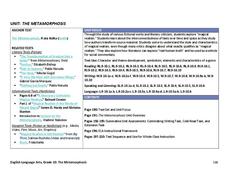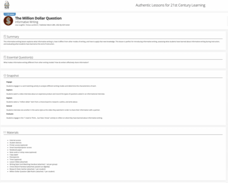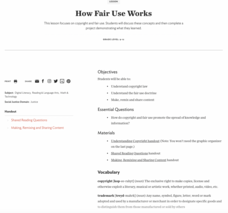Building Evidence-Based Arguments: Grade 9
High schoolers investigate the dilemma of a proportional response with a lesson about the history of terrorism and militant extremists in the United States. As they examine memos from the FBI and speeches from President Bush and Obama,...
Echoes & Reflections
Jewish Resistance
Resistance to the Holocaust took on many forms. Learners explore the passive and active resistance of Jewish people who continued their practices and observances, as well as organized resistance against the evils of the Nazis. An...
Echoes & Reflections
The "Final Solution"
Nazi policies shifted from deportation and imprisonment to extermination of the Jewish people in death camps in the "Final Solution." Learners examine photos of artifacts, read poetry written by survivors, analyze testimony from...
Echoes & Reflections
Survivors and Liberators
The end was just the beginning. The period immediately after the end of World War II and the Holocaust is often called "The Return to Life" as survivors looked to reunite and recreate broken families and shattered lives. A two-lesson...
Echoes & Reflections
Nazi Germany
The Holocaust was an evolution of anti-Semitism, scapegoating, and targeted violence against Jews with Nazi policies. A resource unpacks the escalation in violence, along with the erosion of democratic institutions, during the 1930s....
Echoes & Reflections
The Children and Legacies Beyond the Holocaust
Using video testimony, primary source documents that detail international agreements, and structured discussions, learners consider the precarious position of children during the Holocaust and other international conflicts, and how to...
Echoes & Reflections
Rescuers and Non-Jewish Resistance
What does it mean to be a rescuer during the time of the Holocaust? Learners consider the role of those who resisted the Nazi invasions, including hiding Jewish people, throughout Europe. Activities include listening to the testimony of...
Echoes & Reflections
The Ghettos
Young historians examine primary sources, including diaries, poems, and photographs, to consider the conditions in the ghettos and how they fit into the escalation of the Third Reich's plot against the Jewish people.
California Department of Education
Plagiarism is Stealing!
Stop, thief! Do your pupils understand the consequences of plagiarism? Lesson three of six in a series of college and career readiness activities demonstrates the dangers of taking credit for someone else's work. Learners engage in...
Fluence Learning
Writing an Argument: Innovation in America
Are American young people prepared to become tomorrow's leaders in technological innovation, or does an obsession with being cool sidetrack essential skills? That is the question freshmen and sophomores must address in a performance...
Louisiana Department of Education
The Metamorphosis
How can something be true even if it didn't happen? Invite your classes to investigate the truths found in the world of magical realism as they analyze short stories, poems, informational texts, video, and art from this genre.
MENSA Education & Research Foundation
Utopia/Dystopia: The American Dream
America was founded by dreamers, and the American dream still resonates in our country today. Track the American dream from its Puritan beginnings to its optimistic descendants with a instructional activity that focuses on speeches...
Common Sense Media
Private Today, Public Tomorrow
What responsibility do we have to protect the privacy and safety of others when posting information about them online? This is an essential activity for every learner today experiencing their social and professional worlds in an online...
K20 LEARN
The Million Dollar Question: Informative Writing
Introduce high school freshmen to the characteristics of informative writing with a 5-day instructional activity that distinguishes informative writing from other modes. Scholars learn how to search for and cite reliable resources, then...
American Institute of Physics
Historical Detective: Edward Alexander Bouchet and the Washington-Du Bois Debate over African-American Education
Young scientists meet Edward Alexander Bouchet who, in 1876, was the first African American to receive a PhD in Physics. This two-part lesson first looks at the debate between Booker T. Washington and W.E.B. Du Bois about the type of...
NASA
The Big Climate Change Experiment Lesson 4: Weather Versus Climate
Decide whether to learn about weather. An illuminating lesson has scholars first watch video clips and discuss the difference between weather and climate. Using their newfound knowledge, they create analogies to illustrate this...
NASA
The Big Climate Change Experiment Lesson 2: The Influence of Climate on Culture
No conversation about culture is complete without considering climate. Scholars first view videos of climate witnesses who describe the climate in their regions and how climate change affects their daily lives. They then write essays or...
Teaching Tolerance
Thanksgiving Mourning
Two primary sources, a speech, and an article provide tweens and teens with different perspectives of the American Thanksgiving holiday. After analyzing Wamsutta James' suppressed speech and Jacqueline Keeler's article, class members use...
Facing History and Ourselves
Reflection and Action for Civic Participation
Slacktivist or activist? Bystander or upstander? Positive social change requires involvement and commitment. After reading a series of articles about young people who chose to get involved, scholars examine a framework that helps peers...
Teaching Tolerance
How Fair Use Works
What's fair is fair! Using the resource, scholars discuss the key differences between fair use and copyright. Next, in small groups, pupils create and present projects that demonstrate fair use of copyrighted material, such as a song,...
Teaching Tolerance
You Are the Product
What does it mean for a product or service to go viral? Scholars explore the topic by reading an article about the economics of social media. After reading, they complete a 3-2-1 data chart with information they learned from the text and...
American Battlefield Trust
Gettysburg Address: Abraham Lincoln's Greatest Speech
Most Americans have heard of the Gettysburg Address, but may not know what it means and why is it so important. Following guidance and scaffolded prompts, scholars analyze the short document that left an undeniable impact on the American...
American Battlefield Trust
Joshua Chamberlain Lesson Plan
While Joshua Chamberlain's name is not as iconic as Abraham Lincoln or Robert E. Lee, he still played a pivotal role in the military engagements of the Civil War. Using two secondary sources—including one that draws heavily from his...
PBS
Extranjeros and Expansion
A three-part lesson gives light to the Unites States expansion from the view of Texans, New Mexicans, and Californians. Through videos and written activities, scholars work collaboratively to research specific individuals and their...

























